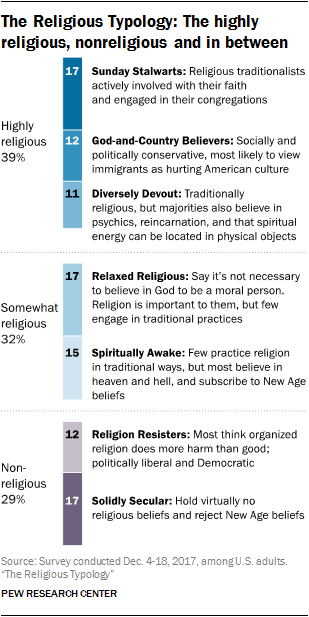 Most U.S. adults identify with a particular religious denomination or group. They describe themselves as Catholic, Baptist, Methodist, Jewish, Mormon or Muslim– to name just a few of the hundreds of identities or affiliations that people give in surveys. Others describe themselves as atheist, agnostic or say they have no particular religious affiliation. These are the conventional categories into which Americans sort themselves. But a new Pew Research Center analysis looks at beliefs and behaviors that cut across many denominations – important traits that unite people of different faiths, or that divide people who have the same religious affiliation – producing a new and revealing classification, or typology, of religion in America.
Most U.S. adults identify with a particular religious denomination or group. They describe themselves as Catholic, Baptist, Methodist, Jewish, Mormon or Muslim– to name just a few of the hundreds of identities or affiliations that people give in surveys. Others describe themselves as atheist, agnostic or say they have no particular religious affiliation. These are the conventional categories into which Americans sort themselves. But a new Pew Research Center analysis looks at beliefs and behaviors that cut across many denominations – important traits that unite people of different faiths, or that divide people who have the same religious affiliation – producing a new and revealing classification, or typology, of religion in America.
 The new typology sorts Americans into seven groups based on the religious and spiritual beliefs they share, how actively they practice their faith, the value they place on their religion, and the other sources of meaning and fulfillment in their lives.
The new typology sorts Americans into seven groups based on the religious and spiritual beliefs they share, how actively they practice their faith, the value they place on their religion, and the other sources of meaning and fulfillment in their lives.
Race, ethnicity, age, education and political opinions were not among the characteristics used to create […]











I really have a hard time believing in a survey of only 4000+ people to represent a country of what is I think around 3,000,000 people. I do believe there is as many personal belief systems as there are people in the USA. Sure there are people who “say” they believe the same as others, but their actual beliefs may really be more fluid, and subject to change, than this survey suggests. It is a person’s actions; especially the way they treat others, that is more important in the long run. I therefor think the “Golden Rule” is more important than any religion, belief, or governmental law, because all these things are subject to change.
Post Script: Whoops -I left off a few zeros: that should have been 300,000,000 people, not 3,000,000. Sorry about that!